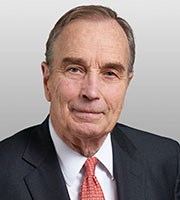5 minutes with... Jonathan Blake
 When did you decide to become a lawyer? Why?
When did you decide to become a lawyer? Why?
As a senior in college, law seemed like a tree with many interesting branches. Moreover, I have been fortunate enough to be at a firm with many branches within the practice of law.
How did you get into communications and media law? By design? Chance? Both?
Back in the Dark Ages, one’s area of practice was largely determined by what new project needed to be handled. So when I walked into the firm at 9:00am on June 1, 1964, a project came into the firm that concerned communications and media law issues. I subsequently went on to work on wage/price control matters, general litigation, antitrust and administrative law matters, as well as low-income housing, conservation and civil rights issues in the pro bono sector. Then Nixon’s allies challenged the renewal of The Washington Post’s TV stations in Florida.
What do you consider to have been your big break?
That was a huge break which lasted three years. Other big breaks included becoming involved in the launch and development of digital television and mobile phone services both in this country and globally. My biggest break has been membership in the Covington family.
What differences do you see in today’s legal market compared to when you started?
A major difference is the role and functions of in-house general counsel, and I am uncertain as to whether all the changes have been beneficial. In my experience, the most effective inside counsel facilitate the process of outside counsel becoming close enough to chief executives and other leaders in their companies to provide strategic advice.
"In my experience, the most effective inside counsel facilitate the process of outside counsel becoming close enough to chief executives and other leaders in their companies to provide strategic advice."
What achievement are you most proud of?
My leadership roles in the birth and development of the mobile phone and digital television industries, as well as serving as chair of our firm’s management committee.
How did it feel winning an Emmy for your role in facilitating the transition to digital high definition television?
I was totally surprised, and of course, honored.
How can you see the practice of communications and media law evolving in the next ten years?
The trend toward concentration within the industries we serve will continue, thereby shrinking the numbers of lawyers in our Bar. This trend will be partially offset by the expansion of new consumer services, products and technological innovations.
What do you consider your greatest failure or regret?
I am almost embarrassed to say that I have no substantial regrets. I really hate to see exceptional young lawyers leave the firm. Over the years I have also diligently tried to redress the underappreciation that policy makers and the public continue to place on the special value of local television services.
What have you enjoyed most during your career in the legal profession?
Working with teams, especially those that include bright young lawyers learning the trade and lawyers from other disciplines. Exploring collaboratively to build the best possible strategy, and then executing it is as exciting and rewarding a professional experience as I can imagine.
And enjoyed the least?
Billing. If one doesn’t put time and care into the billing process, sorting out the resulting issues can be frustrating and time-consuming. That can also be the case even when the billing process has been undertaken with diligence and fairness.
What law would you change, abolish or create?
It seems almost a technicality, but I would repeal the so-called ‘Sunshine Act’ which prohibits two or more FCC Commissioners (or the heads of other administrative agencies) from meeting not on the public record to discuss policy decisions. I have criticized that requirement as deterring consultation and collaborative decision-making since it was enacted decades ago.
UPDATE: Coincidentally, Congresswoman Eshoo today introduced a bill to rectify the problem with the Sunshine Act that I identified in the Q and As yesterday. But passage is another matter and I am not holding my breath for it to happen. [March 19, 2015.]
Who is your legal hero?
The young lawyers with whom I have worked and the dedicated and smart government officials who strive to serve the public interest.
What career would you have in your second life?
I might have chosen the same one. Otherwise, coaching and teaching young kids, some of which (coaching) I have done extensively as a volunteer.
What slogan would you like to be remembered by?
“He listened well.”
What advice would you give to students trying to enter the legal profession today?
Clear thinking and clear writing go together. Never stop working on them. If something bothers you about a draft, always pursue the source of your unease with tenacity and fix it. Don’t sweep it under the rug.
And secondly, to those who hope to ultimately get into communications and media law?
Actively master the technologies involved, keep current with them and seek to understand their legal and policy implications.